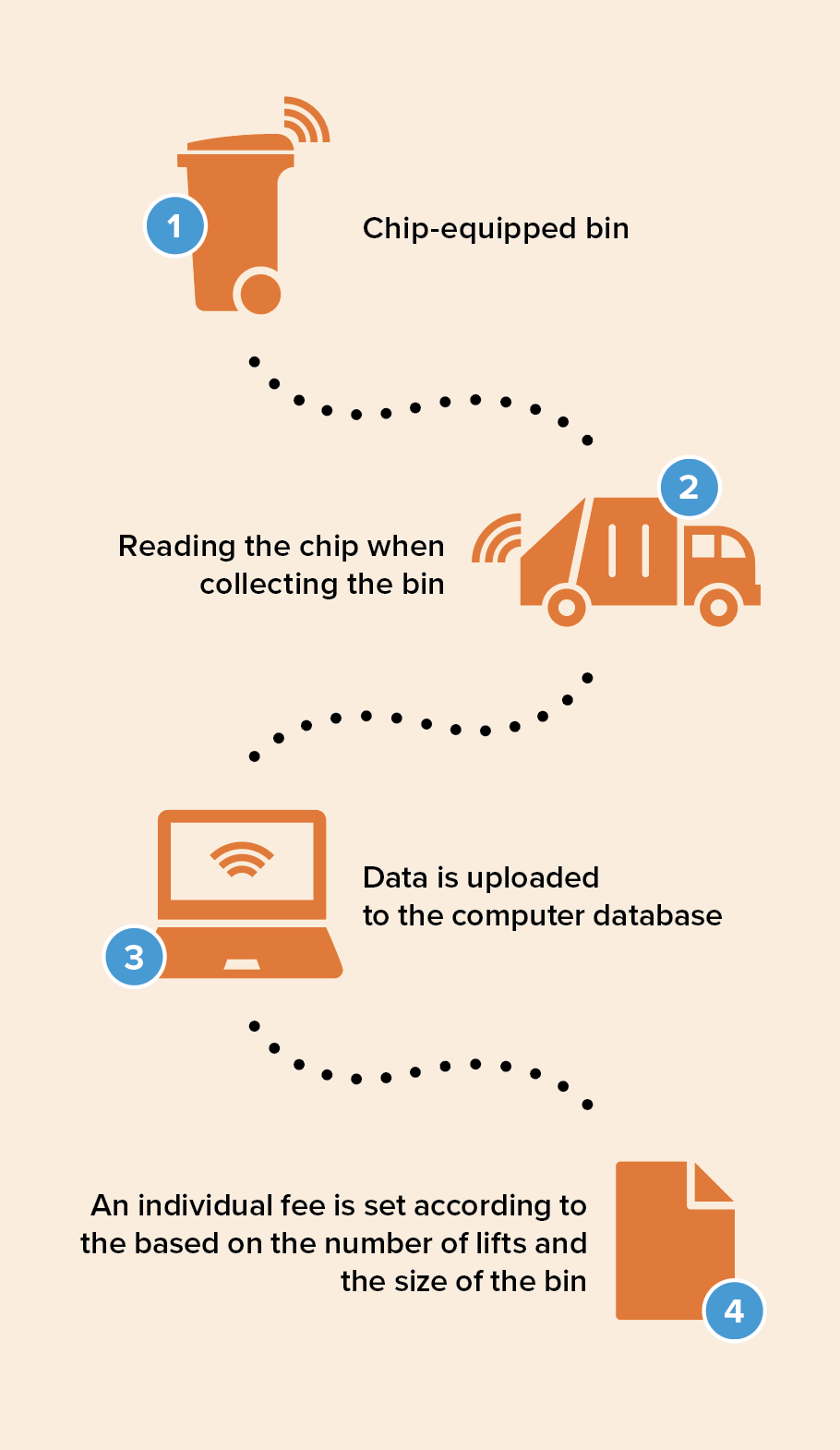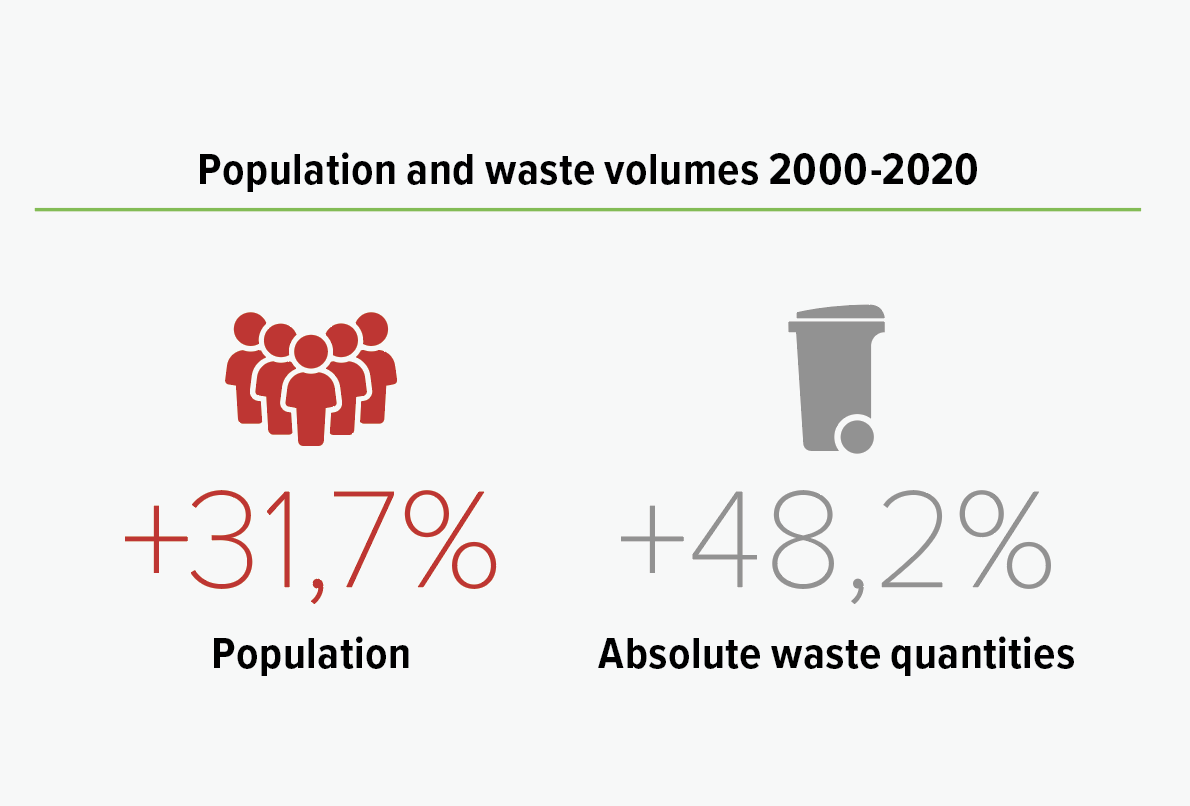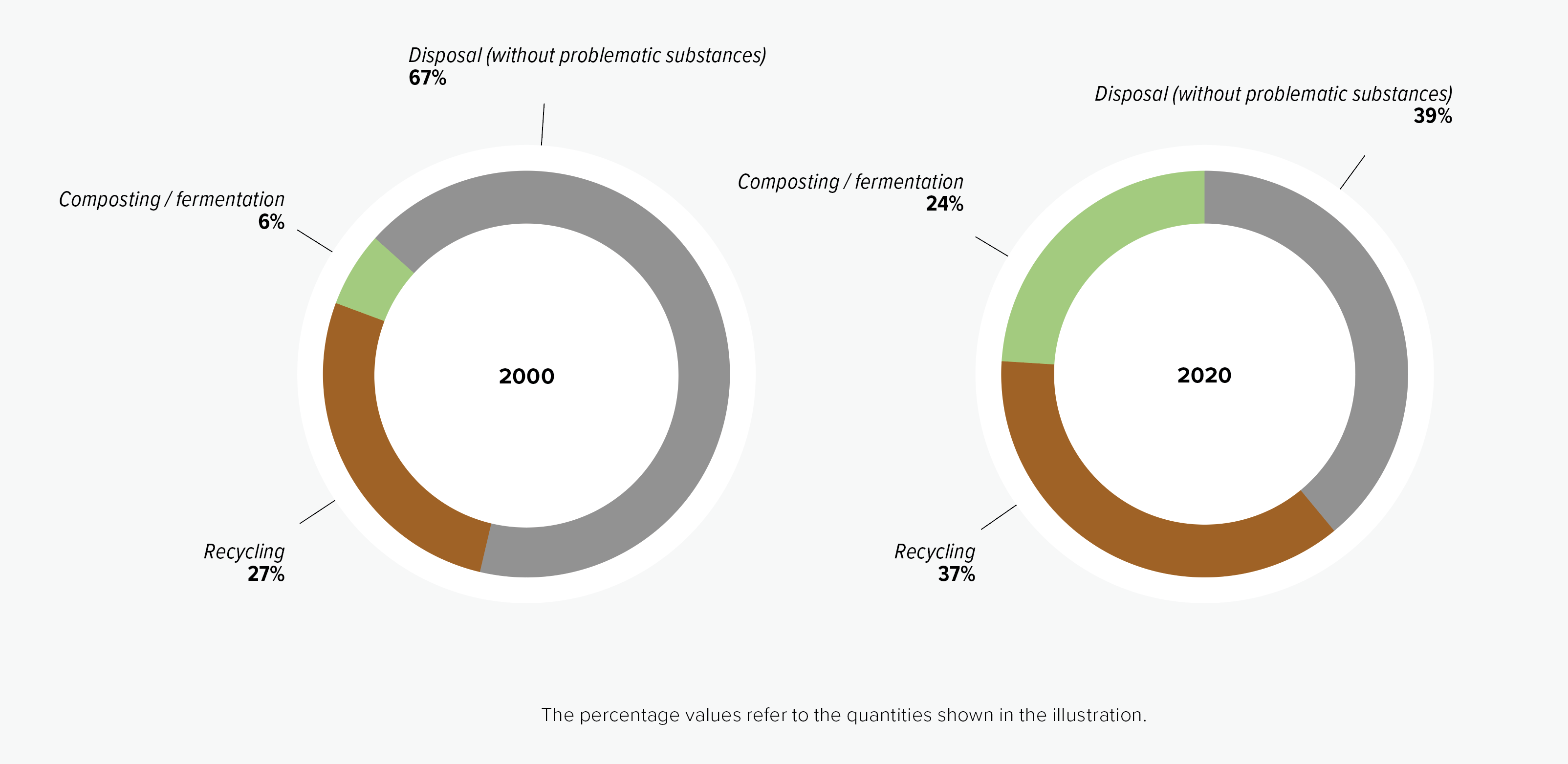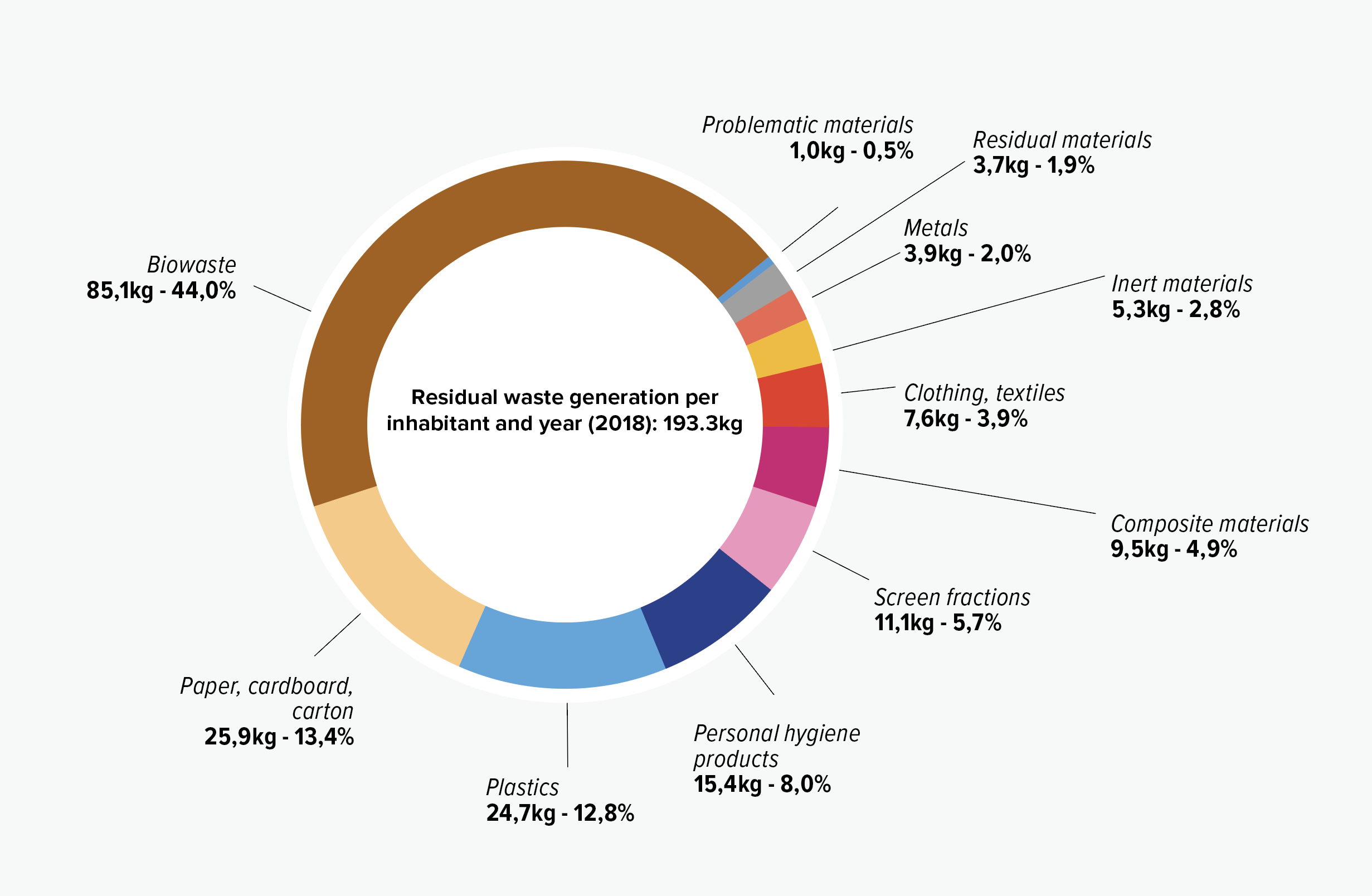A waste weighing system for our bins
The “smart bin” is coming
In the city of Grevenmacher, the identification system for the residual waste bins will be introduced this year. The disposal of your waste will become more polluter-fair with the changeover to the “smart bin”. For this purpose, a digital chip will be affixed to your grey waste bin so that it can be clearly assigned to your property and linked to your fee notice.
On the way to a “waste-free society” or circular economy, we must all pay attention to the prevention of unnecessary waste and the use of reusable products. This not only saves resources, but also protects the environment. Through the “smart bin” you can influence the waste disposal fees you will have to pay. If you produce less waste and put your bin out less often for emptying, you will also pay less fees.
Our joint efforts by the city and its citizens regarding waste management in favour of the environment and the climate are paying off! We would like to thank all residents for their excellent cooperation for improved waste management.
The Council of Aldermen of the City of Grevenmacher
Introduction of the waste weighing system
With the aim of ensuring that waste is disposed of according to the polluter-pays principle, as provided for by the legislator in Article 17 of the amended Waste Law of 21 March 2012, an electronic weighing and container identification system, or identification system for short, is required for the waste.
The waste bins are equipped with an RFID* transponder chip and, if necessary, with a sticker that allows the waste bins to be clearly identified and assigned to the respective household. The transponder is normally inactive and only sends its identification parameters after it has been supplied with energy by alternating magnetic fields generated by a reader within a short range. Each time the bin is emptied by the collection vehicle, it is weighed as it is raised and lowered to determine the emptying weight.
*Radio-Frequency Identification – Identification with the help of electromagnetic waves
The weighing system on the waste collection vehicle automatically recognises the transponder via a reader and transmits the data recorded during emptying (date and time of weighing as well as transponder identification number and emptying weight) to a central administration system in the on-board computer, where all data is collected. Only in the last step of data processing is the data collected anonymously up to that point fed into the invoicing software for the purpose of invoicing.
So as to ensure that waste is disposed of in fair way and that the costs are covered and invoiced in a manner that is fair to the polluter, it is necessary to amend the Ordinance on Fees and Charges.
- First acclimatisation phase: Waste quantities are recorded for statistical purposes.
- Second phase: The Fee Ordinance is applied.
The basic idea is that depending on the amount of waste to be disposed of, the disposal fee will be correspondingly high or low.
Citizens are thus encouraged to separate their waste as well as possible and to make optimal use of the existing collection structures (recycling park and separate waste collection) in order to minimise the volume of residual waste, which has to be disposed of at very high cost.
In preparation for the introduction of the identification system from 2022, all household waste bins must be equipped with a previously mentioned transponder. This work will be carried out during 16 & 17 June 2022 by the municipality’s technical service.
Citizens do not need to take any further action in this matter. After a certain transitional period, however, only those bins equipped with a transponder will be emptied.
For further information and practical advice on waste management, the services of the municipal administration are available at any time.
Based on a study on waste development in the urban area of Grevenmacher, increasing amounts of waste and changing material flows were identified. As expected, the development of the absolute waste quantities goes hand in hand with that of the population.
The composition of the waste in the grey domestic waste bins in Grevenmacher in 2018, as determined within the framework of the last analysis, shows that there is still considerable potential for avoidance and recycling, particularly in the case of biowaste, paper/cardboard and plastics. These three fractions alone accounted for more than 70% of the residual waste generated in Grevenmacher!
How do I separate my waste?
Tips for optimising waste management in the household
Organic waste
The content of the residual waste bins still consists of approx. 44% biowaste, i.e. a type of waste that can be largely recycled (composted or fermented) and thus fed into the natural cycle.
With the aim of clarifying this circumstance, some basic aspects of biowaste recycling should be recalled:
→ The recycling of organic waste handles resources considerately. Composts and fermentation residues can be used as fertilisers and soil improvers.
→ Bio-waste makes up the largest share of household waste by weight. Its disposal with the mixed municipal waste in incineration requires increased technical effort. Reducing the amount of residual waste by largely removing the organic fraction leads to a significant reduction in disposal costs. The price per tonne for the recycling of organic waste (80€/t) is significantly cheaper than that for the disposal of residual waste (175€/t).
What belongs in the brown organic waste bin?
→ Kitchen waste, all types of food residues (raw, cooked or spoiled) such as fruit and vegetables, coffee grounds, tea bags, meat, fish, cheese, bread, pasta
→ Non-woody garden waste such as grass cuttings, leaves, weeds, fallen fruit, flowers.
The organic waste bin, which has been introduced in the city of Grevenmacher for some time now, enables its users to significantly reduce the amount of residual waste in precisely this way.
To make it even easier and more convenient for citizens, the municipality has introduced free monthly bin cleaning.
If required, there is also the possibility to participate in the regular collection of green waste from March to December.
For easier handling, bio-waste collection bags made of paper or cardboard shopping bags (from the bakery, etc.) can be used. However, collection bags made of plastic (whether so-called “biodegradable” or not) should be avoided, as they are a contaminant in the selected recycling process and require costly disposal.
Plastic packaging waste
Around 13% or 24kg/inhabitant/year of the content of the residual waste bin is plastic waste and mainly packaging waste.
What can be put in the blue bag?
→ Plastic bottles and flasks, metal packaging, beverage cartons, plastic films and bags, plastic pots, cups and bowls.
What must not be put in the blue bag?
X Paper, cardboard, black plastic and multi-layer packaging
For further information, please visit www.valorlux.lu
Paper, Cardboard & Carton
Paper and cardboard represent about 13.50% of residual waste, a proportion that can certainly be reduced, especially by avoiding unnecessary quantities and using the municipality’s collection system.
Last but not least, we would like to draw your attention to the RECYCLINGPARK of the city at the SIGRE site (16, rue de Flaxweiler L-6776 Grevenmacher), which is available on 2 days every month (see waste calendar). A wide range of recyclable and problematic materials can be handed in here in a controlled manner!
For more information and practical advice on waste management, please contact the services of the municipal administration and the SIGRE inter-municipal syndicate.




